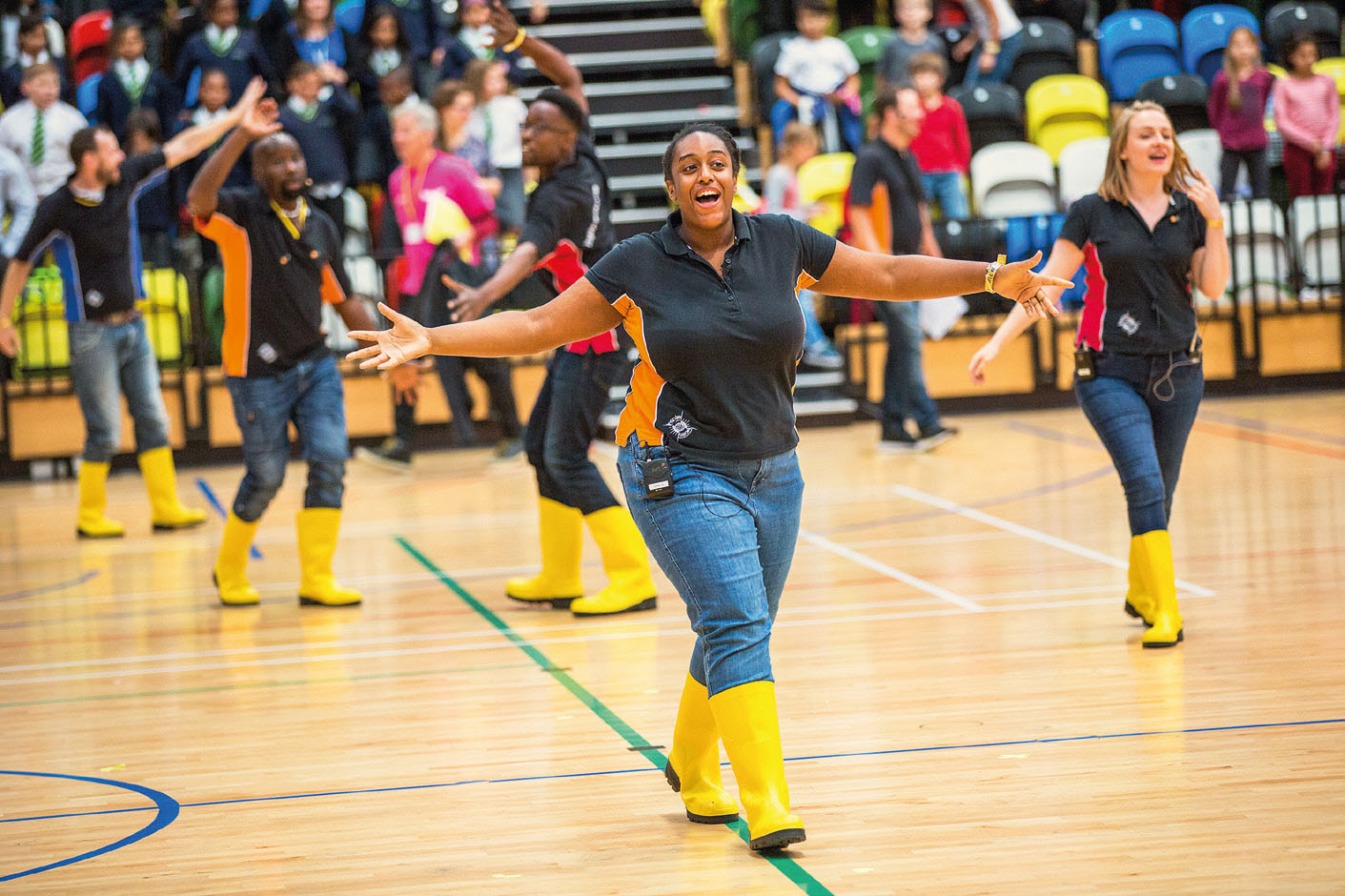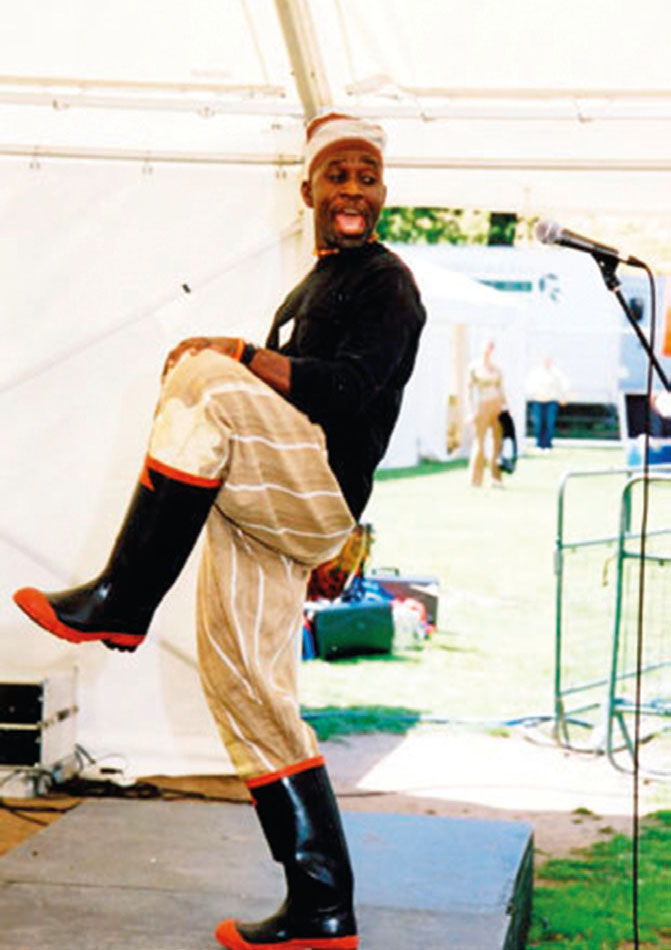
Inspire-works is a team of 30 workshop facilitators that delivers world music courses and one-off classes in schools, ranging from West African drumming to Indonesian gamelan and Japanese Taiko. Of all the classes available, via online resources and staff-led workshops, there is one which has an unusual footwear specification: wellington boots.
‘We first came across South African gumboot dance when we were researching and developing materials that we were going to use for the first Street Child World Cup that took place in Durban, South Africa,’ explains Mike Simpson, one of the company's co-founders. ‘We were looking for fun and creative musical materials that could be delivered by our facilitators in UK schools that linked to the South Africa theme. One of our facilitators is the son of a Zimbabwean goldminer who learned gumboot dance from his dad and other men in his community.’
Born from oppression
The South African gumboot dance originated as a response by black mineworkers to their racial oppression under apartheid. Working in the gold mines during the implementation of a migrant labour system – which saw workers migrating from Botswana, Zimbabwe and Mozambique – miners were separated from their families to work in terrible conditions underground. For up to three months at a time, miners would work in total darkness, forbidden from speaking to one another. The mines were flooded with water, causing health problems for the workers, but instead of draining the water the authorities issued all miners with wellington boots, or ‘gumboots’ as they are known in South Africa. The oppressive rules and restrictions meant that workers turned to another form of expression.
Miners used to sound rhythms by slapping their boots, stomping their feet and rattling their shackles. Not only were they expressing their identity, they were also using the sounds to communicate with one another in the workplace. The movement spread outside of the mines and became a form of entertainment, with dance troupes performing routines that celebrated the workers’ traditions, sometimes mocking and criticising their bosses too, without them being aware.
Teaching the dance
The dance is a mixture of drumming, body percussion and dance/movement, which fits perfectly alongside the other world music workshops available through Inspire-works, in particular the African Drumming one-off workshops and First Access programmes. Schools are able to choose between one-off or long-term workshops, and between three areas of study: Asia, the Americas, and Africa. The African Drumming courses teach about west- and north-African drumming, so the gumboot classes bring traditions and music from southern Africa into the learning program.
Simpson is a professional percussionist, and it was after spending an intensive year studying Indonesian arts in Bali in 2002 that he decided to set up Inspire-works with his wife Jacqui, a theatre director. By the end of 2016, it had 25 workshop facilitators in over 650 schools, providing sessions for over 65,000 students in a year. In 2003, when the Simpsons founded the company, their concern was to bridge a gap in music education, with Mike explaining: ‘Not only did we have a passion for world arts and music, but we felt that an understanding of cultures surrounding music was a crucial part of learning.’
With its team, the company delivers classes which are flexible, depending on the age and timeframe of each workshop. The Simpsons have found that gumboot dancing fits very well within this structure, as there are some very basic steps and techniques but lots of harder layers that can be added as the participants progress. One thing they always include, regardless of the age range of participants, is the cultural history and context of the dancing style and how it originated.

While originally developed by men, the dance is now practised by people of all genders
Bringing inspiration to your school
Inspire-works is the world-music provider for several music hubs and, in addition, schools in the south east of the UK can also approach the company directly to arrange a workshop visit.
Any school anywhere in the world can participate in the South African gumboot dance course, which forms part of the online African drumming course that is available on the Inspire-works website. It is the provision of one-off workshops and First Access programmes in schools throughout the South-East that Mike calls the company's ‘bread and butter’. The programmes cater for all ages, as well as CPD training and class observation.
‘We've delivered gumboot dance workshops with all ages from EYFS sessions to GCSE,’ says Mike, whose decision from day one was to include dancing as part of their music workshops. ‘With the majority of the world music genres we teach, dance always goes alongside. For example, west-African drummers are always accompanying dance, an Indonesian gamelan is always accompanying a dance troupe or shadow puppet play, Brazilian samba drumming is never without samba dance in the Rio carnival and Indian dhol drummers are always accompanying dancers at an Indian wedding in the Punjab’.
So far it has been noted by workshop leaders that the participants in primary schools have enjoyed wearing their wellies to create music. With lots of energy required and physical movement, classes are left feeling invigorated and enthused at the end of a session. The idea is that the older students in secondary schools can appreciate the complexity and diversity of the sounds and patterns created by hitting different parts of the boots or body. Participants learn initially through watching videos provided by Inspire-works, then put things into practice by copying rhythms followed by some rhythmic improvisation. As well as practical elements, there are log book activities, and by the end of a single two-hour session the learning outcomes can range from musical devices and terminology, such as call and response and syncopation, to social, moral and cultural learning focused on South Africa's history.
Online courses are designed to provide teachers with training and flexible lesson plans when implemented as part of a term-long scheme that fulfils specific National Curriculum learning outcomes. The main skill areas involved in the gumboot workshops are rhythmic skills and ensemble skills, the latter of which encompasses communication skills through creating and performing together. Practical knowledge may then be applied to other subject areas, and students are encouraged to reflect on their own work on how they might improve their standard – again, a transferable skill. Above all, Inspire-works feels that learning about traditional music and dance such as the gumboot, in a 100% participatory manner, provides exposure to the music and rituals of different countries, and with it a deeper knowledge and understanding of other cultures.

Gumboot dancing has come a long way since its brutal birth








